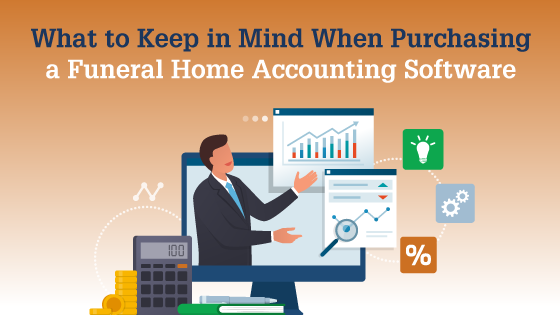As a funeral director, one of your most important tasks is keeping track of your money––both in terms of revenue and expenses. Detailed financials are not only an essential part of planning, but they also come in handy when figuring out what you owe in taxes.
Rather than employ a full-time bookkeeper, most small business owners turn to the help of accounting software. When implemented effectively, accounting software can streamline the processes of recording payments, tracking expenses, and invoicing clients. But it’s important to remember that not all accounting software is created equally. Moreover, not all accounting software is the right fit for every type of business.
Here are some questions to ask when purchasing funeral home accounting software.
Does It Have the Tools You Need?
First and foremost, the software you choose should make things easier, not more complicated. In addition to making sure a digital tool has an intuitive and functional interface, you’ll also want to make sure that it has all the functionality you need. For most funeral homes, this might include software that automatically records transactions, oversees invoicing, connects with business bank accounts, automates payroll processes, and monitors IRS compliance.
Ease of Use
While you’ll undoubtedly call on the help of an accounting professional during tax season, the goal of accounting software is to allow you to accomplish the same functions in the meantime–and with ease. You shouldn’t have to take a course or get tutoring to learn how to use it. Luckily, many accounting software platforms offer free or discounted trial periods.
Do You Prefer Desktop or Cloud-Based?
While desktop-based accounting software used to be the norm, cloud-based programs are quickly eclipsing them in popularity. Before you decide on which type of software to use, it’s important to understand the differences between them.
Desktop
The main benefits of desktop software are security and pricing. Accounting solutions like QuickBooks and Sage may cost a lower annual subscription fee, and all of your data is stored in your local computer, meaning only that computer can access your records.
The primary downside of desktop solutions is accessibility. The computer on which you install this software is the only one that can use it. If anything happens to that computer, all your data may be lost. To share records with your accountant, you’ll have to manually print or download and email them.
Cloud-Based
While desktop accounting software offers a lower annual fee , cloud-based software excels when it comes to accessibility and sharing. Since all of your data is stored on a cloud server, you can access your records from anywhere. Cloud-based accounting software like Quickbooks Online (QBO) and Xero even includes smartphone apps, meaning multiple users can access or alter records from any number of devices.
The primary downside of cloud-based accounting software is in the pricing structure. While prices vary by provider, you’ll most likely have to pay a monthly fee.Can It Integrate with Your Bank?
It’s important that your funeral home accounting software can help you pay bills and employees, but another key component is its ability to integrate with your bank. Most accounting software allows for this; however, not every software is compatible with every bank.
Security
Most cloud-based software will employ firewalls and encryption measures to secure your data, so outside interference is rarely a concern. What you’ll also want to look for is user security. For most funeral homes, you’ll have multiple people accessing your account. That’s why you want to ensure you have the capability to adjust the privileges of these different users, limiting access to specific functions and information. For example, you might not want your employees to view the salaries of other team members.
Does It Limit Transactions?
Accounting software often comes in different sizes, limiting the number of transactions you can process in a given period. In the event that you plan to scale your business––or your funeral home experiences a high volume of sales––be sure your software can adapt.
For example, platforms like Xero have a monthly transaction limit of 1,000. Luckily, when you exceed this limit, you can upgrade your software to accommodate additional transactions.
How Is The Customer Service?
As streamlined as most accounting software is, you’ll undoubtedly run into issues. Whether it’s a matter of understanding the program or a technical glitch, ample customer support is crucial.
In many cases, the purchase of accounting software includes remote training courses. The best accounting software platforms will also offer a dedicated support line where you can access experts to help you mitigate any technical issues.
Have You Gotten an Accountant’s Opinion?
Consider asking your accountant for their software recommendations. This might also help them more effectively find the information they need from your account.
Funeral Home Accountants
Compared to traditional accountants, an accountant who specializes in the funeral industry can better help you monitor your financial health. While accounting software makes for more efficient tracking of data, only a funeral accounting expert can help you make better sense of these numbers.
Whether you’re looking to avoid tax season headaches or get a clearer picture of your financial health, the accountants at Johnson Consulting Group can help. With knowledge of industry-specific accounting practices, a JCG accountant can help you develop budgets, create regular financial reports, and even integrate a new accounting software for your funeral home.
MAKE ACCOUNTING EASY